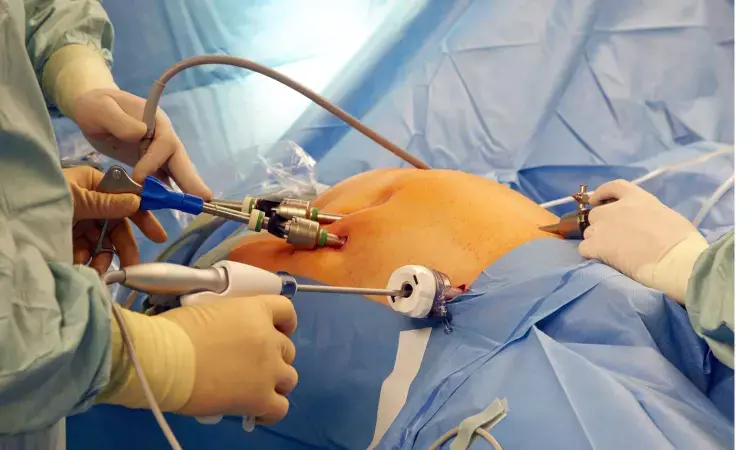- Home
- Medical news & Guidelines
- Anesthesiology
- Cardiology and CTVS
- Critical Care
- Dentistry
- Dermatology
- Diabetes and Endocrinology
- ENT
- Gastroenterology
- Medicine
- Nephrology
- Neurology
- Obstretics-Gynaecology
- Oncology
- Ophthalmology
- Orthopaedics
- Pediatrics-Neonatology
- Psychiatry
- Pulmonology
- Radiology
- Surgery
- Urology
- Laboratory Medicine
- Diet
- Nursing
- Paramedical
- Physiotherapy
- Health news
- Fact Check
- Bone Health Fact Check
- Brain Health Fact Check
- Cancer Related Fact Check
- Child Care Fact Check
- Dental and oral health fact check
- Diabetes and metabolic health fact check
- Diet and Nutrition Fact Check
- Eye and ENT Care Fact Check
- Fitness fact check
- Gut health fact check
- Heart health fact check
- Kidney health fact check
- Medical education fact check
- Men's health fact check
- Respiratory fact check
- Skin and hair care fact check
- Vaccine and Immunization fact check
- Women's health fact check
- AYUSH
- State News
- Andaman and Nicobar Islands
- Andhra Pradesh
- Arunachal Pradesh
- Assam
- Bihar
- Chandigarh
- Chattisgarh
- Dadra and Nagar Haveli
- Daman and Diu
- Delhi
- Goa
- Gujarat
- Haryana
- Himachal Pradesh
- Jammu & Kashmir
- Jharkhand
- Karnataka
- Kerala
- Ladakh
- Lakshadweep
- Madhya Pradesh
- Maharashtra
- Manipur
- Meghalaya
- Mizoram
- Nagaland
- Odisha
- Puducherry
- Punjab
- Rajasthan
- Sikkim
- Tamil Nadu
- Telangana
- Tripura
- Uttar Pradesh
- Uttrakhand
- West Bengal
- Medical Education
- Industry
Bariatric Surgery Boosts Cholesterol Efflux, Potentially Reducing ASCVD Risk: Study

Iran: Researchers have found in a new study that bariatric surgery, especially sleeve gastrectomy (SG), significantly increases cholesterol efflux capacity (CEC), which may help lower the risk of atherosclerotic cardiovascular disease (ASCVD).
The findings are from a systematic review and meta-analysis published in Frontiers in Endocrinology by Tannaz Jamialahmadi and colleagues from the Medical Toxicology Research Center, Mashhad University of Medical Sciences, Mashhad, Iran.
Bariatric surgery is known to reduce cardiovascular risk by improving conditions such as dyslipidemia, diabetes, and hypertension. However, researchers have increasingly focused on specific lipoprotein biomarkers—particularly low-density lipoproteins (LDL), high-density lipoproteins (HDL), and their subfractions—as well as macrophage cholesterol efflux capacity (CEC), a measure of HDL’s ability to remove cholesterol from macrophages. This process plays a crucial role in preventing the buildup of atherosclerotic plaque in arteries.
To explore this association, the researchers conducted a systematic review and meta-analysis of clinical studies assessing CEC after bariatric surgery. A comprehensive search of PubMed, Scopus, Web of Science, and Google Scholar, up to May 2024, identified 55 studies, of which 8 met the inclusion criteria. These studies provided follow-up data on changes in CEC after bariatric surgery, specifically focusing on the two most common procedures—Roux-en-Y gastric bypass (RYGB) and sleeve gastrectomy (SG).
The key findings were as follows:
- The pooled analysis revealed a nonsignificant overall increase in total cholesterol efflux capacity (CEC) following bariatric surgery (SMD: 0.361).
- Subgroup analysis revealed procedure-specific differences in outcomes.
- Sleeve gastrectomy resulted in a significant increase in total CEC (SMD: 0.748).
- No significant improvement in total CEC was observed after Roux-en-Y gastric bypass (SMD: -0.341).
- A significant reduction in ABCA1-dependent CEC was noted following Roux-en-Y gastric bypass (SMD: -1.545).
- ABCA1-independent CEC significantly increased after surgery (SMD: 0.932).
- These findings suggest that HDL functionality changes differently depending on the surgical procedure.
- The increase in ABCA1-independent CEC may indicate compensatory mechanisms promoting cholesterol removal through alternative pathways.
Overall, the findings suggest that sleeve gastrectomy may yield more favorable improvements in cholesterol metabolism compared to Roux-en-Y gastric bypass. By enhancing total CEC, particularly through ABCA1-independent pathways, SG could play a protective role against ASCVD.
The authors acknowledged several limitations, including the small number of available studies, differences in follow-up duration, variations in surgical techniques, and population heterogeneity across studies. These factors, they noted, limited the statistical strength of their conclusions.
"The analysis reinforces the growing evidence that bariatric surgery—especially sleeve gastrectomy—can improve HDL functionality, which in turn may contribute to reducing long-term cardiovascular risk in patients with obesity. Further large-scale, high-quality studies are needed to better understand the mechanisms linking specific surgical techniques to lipid metabolism and cardiovascular outcomes," the authors concluded.
Reference:
Jamialahmadi, T., Mirhadi, E., Reiner, Ž. et al. Improvements in cholesterol efflux capacity of HDL after bariatric surgery in patients with obesity: a meta-analysis. BMC Surg 25, 474 (2025). https://doi.org/10.1186/s12893-025-03233-9
Dr Kamal Kant Kohli-MBBS, DTCD- a chest specialist with more than 30 years of practice and a flair for writing clinical articles, Dr Kamal Kant Kohli joined Medical Dialogues as a Chief Editor of Medical News. Besides writing articles, as an editor, he proofreads and verifies all the medical content published on Medical Dialogues including those coming from journals, studies,medical conferences,guidelines etc. Email: drkohli@medicaldialogues.in. Contact no. 011-43720751
Next Story


